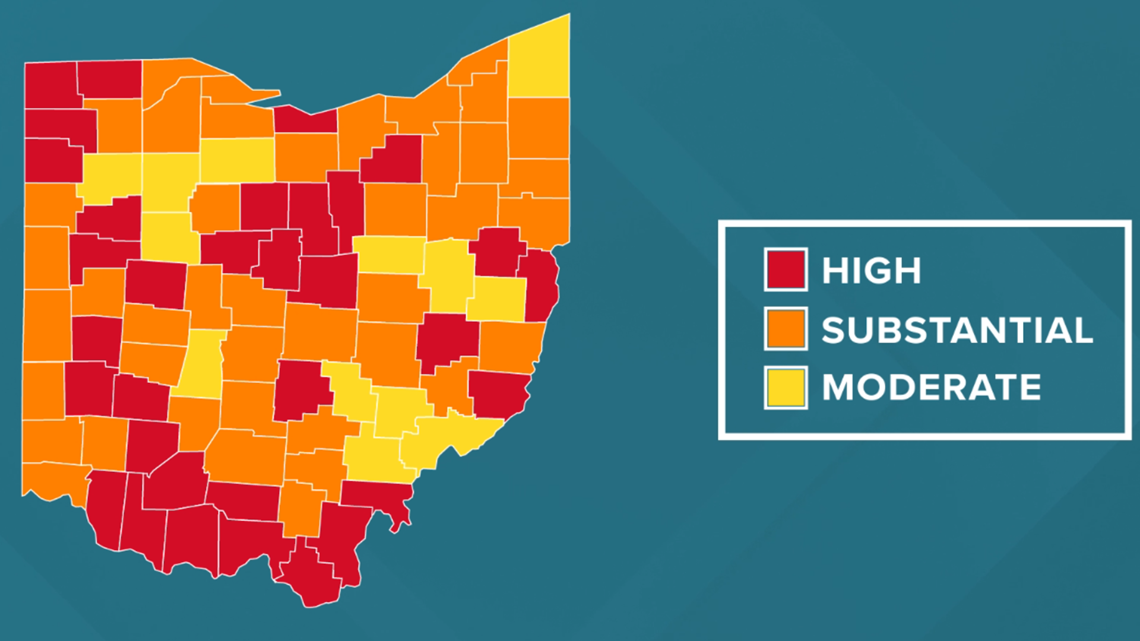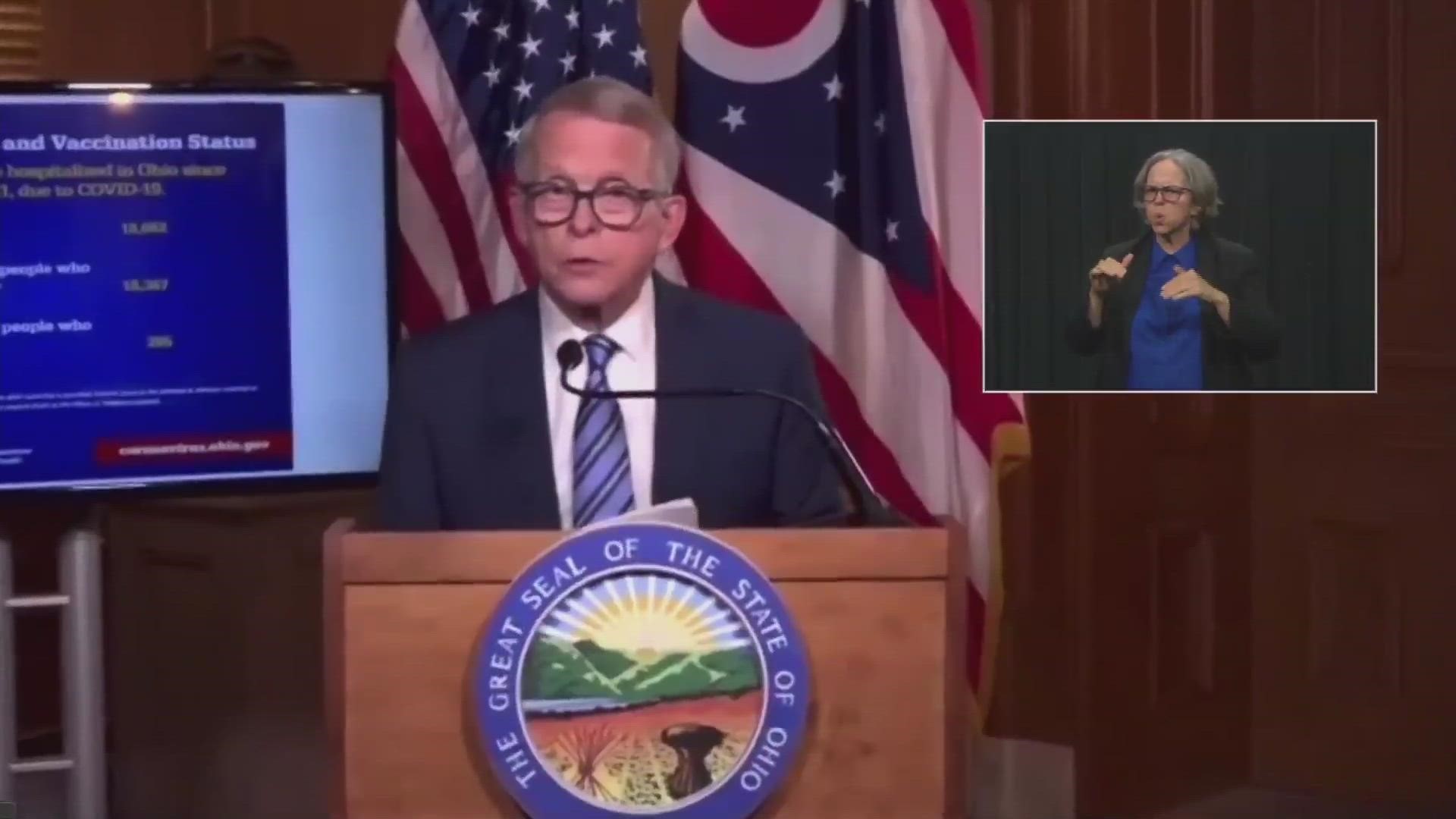COLUMBUS, Ohio — Ohio Gov. Mike DeWine held the first COVID-19 news conference in several weeks as the state experiences a growing number of new infections.
Joining DeWine was Dr. Bruce Vanderhoff, the chief medical officer for the Ohio Department of Health.
The governor and chief medical officer both told a story of "two Ohios" where vaccinated Ohioans are safe and unvaccinated Ohioans remain unsafe. DeWine still held fast, however, to individual choice and reiterated that there will not be a statewide mask mandate, regardless of whether State Bill 22 was in effect or not.
"We are at the point today where individual choice is the most important thing. We have the vaccine and people can choose to get the vaccine," DeWine said. "We know the power of masks. People and institutions can make that decision. Data shows how safe people are when they get the vaccine."
DeWine opened the news conference reiterating the CDC's definition of what a "substantial" and "high" spread of COVID-19 in a community is, noting 50-100 cases per 100,000 is considered substantial while more than 100 cases per 100,000 is considered "high."
As the delta variant becomes the most prevalent form of COVID-19, DeWine said the state is seeing the spread and feeling its effects.
"Hospitalizations were going down, down, down and we were happy about that. Now, they're going back up," DeWine said. "On July 23, 391 people were with COVID-19 in hospitals statewide. On Aug. 5, the state has 857 hospitalizations."


DELTA VARIANT Q&A
Vanderhoff answered a series of questions about the delta variant, noting, "it's important for us all to recognize that this virus is not the common cold. This is a nasty virus that can cause inflammation of your blood vessels and other organs."
He said that the state is seeing an upward trend in cases and hospitalizations, pointing the finger at delta as the culprit. Vanderhoff outlined three things to know about the variant:
1. It is absolutely more contagious. That means it takes less of the virus to go from an infected person to another infected person. It's about 50% more contagious than the alpha variant that preceded it. That was 50% more contagious than the type that came before that. Delta might cause an infected person to infect 5-8 more people. It is now more contagious than the common cold or the flu.
2. Delta is more dangerous than prior versions of the virus. Data from Canada and Scotland show that people who are infected have a much higher likelihood of being hospitalized.
3. There is mounting evidence that the viral loads with delta are higher than with previous strains. That means delta is reproducing much more quickly once it gets inside of our bodies. This likely explains why doctors are observing more and more that delta makes people sicker, quicker.
Despite all that, Vanderhoff said, vaccines remain very effective against the virus. As a result of delta, he asserted COVID-19 has created two Ohios: One that is vaccinated and well protected and another Ohio that is unvaccinated and vulnerable to the ravages of the virus.
DeWine also asked Vanderhoff to discuss personal decisions that need to be made regarding vaccinations.
Vanderhoff said the delta variant is causing people to evaluate their risks and respond to it, drawing parallels to needing to wear sunscreen or bug spray if going outside.
"If you're in a crowded setting with potentially unvaccinated people, you'd want to wear a mask, If you're unvaccinated, you should get vaccinated because delta spreads like wildfire," he said.
"Our vaccines are absolutely the key to containing this fire and ultimately put it out."
He reiterated that vaccines are the best bet to prevent getting really sick from COVID-19 and to prevent some of the lasting side effects like long COVID.
NATURAL IMMUNITY VS. VACCINATION EFFECTIVENESS
Vanderhoff addressed a claim often seen on social media that natural immunity developed from contracting COVID-19 is higher than immunity from vaccinations. While he said that both the vaccine and natural infection do have the ability to provide durable, lasting immunity, the difference between vaccination and getting "wild COVID" is that vaccination gives a much more predictable response.
"People who get infected have a variable response. Some people have a robust immunity while others don't. Some people get reinfected," Vanderhoff said. "And the vaccine is very safe. The vaccine will not land you in the hospital, produce long COVID or the multisystem inflammatory syndrome."
COVID-19, KIDS AND SCHOOLS
DeWine again looked to personal choice and local decisions when it comes to requiring masks and/or vaccinations.
"Schools are making their choices. We believe in local decisions," DeWine said. "Businesses are making their decisions. When facts change, we'll be back to give you additional information."
When asked if he considers it safe to send unvaccinated children to school without masks, DeWine said his personal choice would be to mask up that child.
"If it was my child, I would send a child to school with a mask," DeWine said.
Vanderhoff said he agreed, saying that this is not a benign virus.
"In many circumstances, well-meaning people have thought mistakenly that this is like getting the common cold. It is not. It is dangerous," he said. "Even for children it causes some very bad outcomes. The multisystem inflammatory condition in children, which causes multiple organs to become inflamed, it very often is striking children who were otherwise pretty healthy.
"... As a parent, I am looking at this and weighing those risks, and thinking I would want to do everything in my power to give my child the safest possible way of going to school If I wasn't able to vaccinate my child, I'd certainly want them to wear a mask."
When kids are in school and are masked, they do not spread COVID-19, even in a crowded situation, DeWine said.
BUSINESSES AND PROOF OF VACCINATION
Businesses around the state are starting to ask for proof of vaccination before letting customers in. The governor was asked if he felt that was an appropriate course of action and whether the state would do something to help those businesses.
"I do not have any plans to come up with some kind of passport or indication that you have been vaccinated," DeWine said. "At this stage, it's not a practical thing that could be done."
VACCINATION NUMBERS GOING UP
The governor said the good news he can point to is that the delta variant is encouraging Ohioans to get vaccinated. Last week vaccinations increased in all 88 counties when compared to first week of July. Among the 22 counties with the lowest vaccination rates, they moved from 1,183 vaccinations overall to 2,735 vaccinations in the last weeks of July compared to first weeks of July.
Vaccines are making the difference, DeWine said, and that is where he intends to continue to put the state's focus.
"The most effective tool we have today is the vaccine. It is even more effective, more powerful than was ever imagined by medical professionals," he said.
DeWine said if a county thinks that incentives will help to increase vaccination rates, the state will help them with funding.
"The name of the game is vaccines. This is where we win. We have two Ohios - we have people who are vaccinated and safe. We have people who are not vaccinated and are unsafe. It is a critical period of time," he said.
"One group of people go about their business with very good confidence they won't end up in the hospital. The other group of people can't say that. Individual choice is what we are about at this point because we have the vaccine."
The news conference was the first one in several weeks and comes on the one-year anniversary of the governor testing positive for COVID-19. He later tested negative that same day, Aug. 6, 2020.
Ohio’s daily COVID-19 cases have seen a steady increase amid growing concerns of the delta variant and its impact across the country. Health officials have said the delta variant is likely to blame for the recent case spikes. Here's the number of new infections Ohio reported since Monday:
- Aug. 2: 895 new cases
- Aug. 3: 1,769 new cases
- Aug. 4: 2,167 new cases
- Aug. 5: 1,969 new cases

